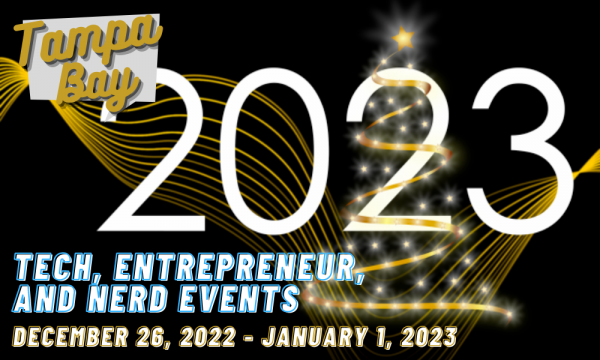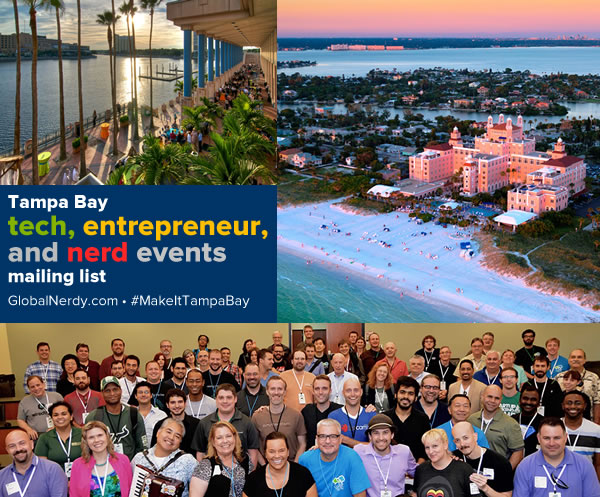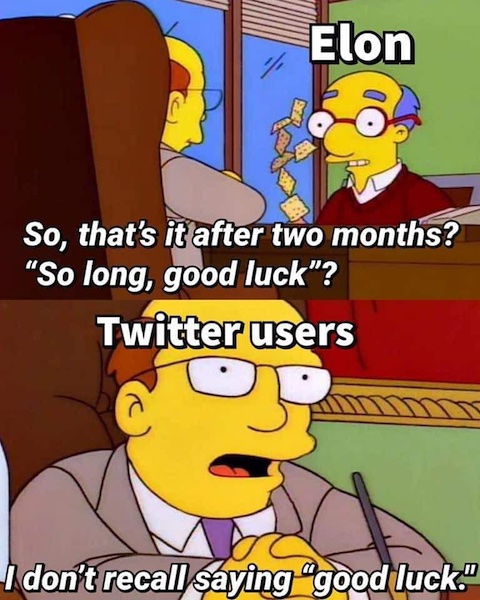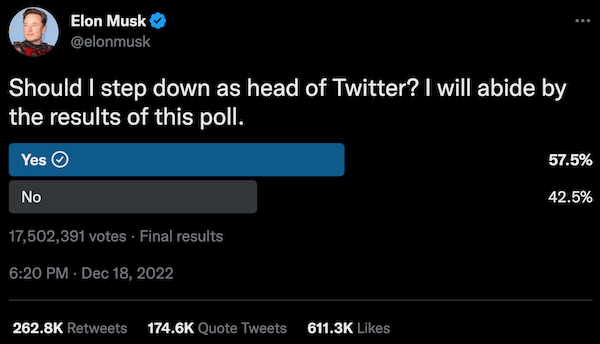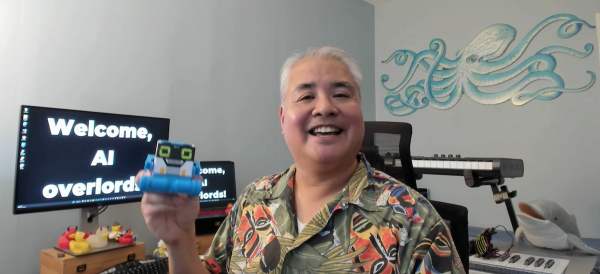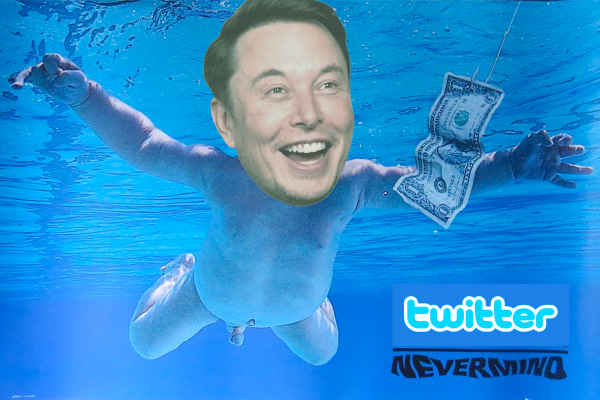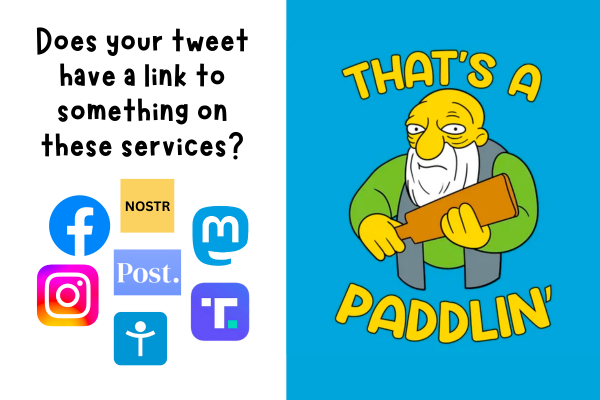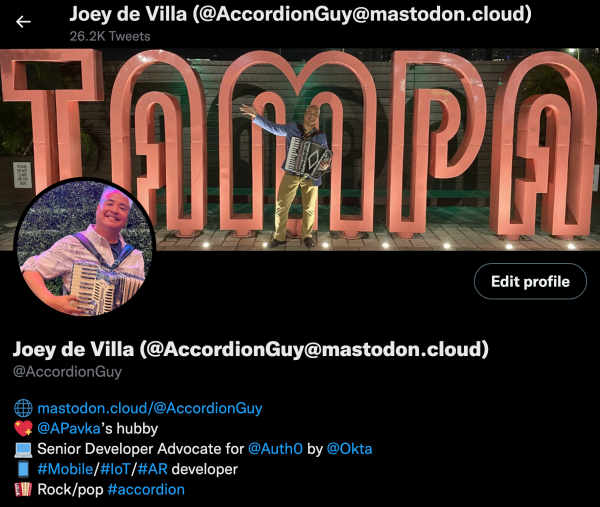Here’s the list of tech, entrepreneur, and nerd events for Tampa Bay and surrounding areas for the last week of 2022: Monday, December 26 through the first day of the new year, Sunday, January 1, 2023!
Every week, with the assistance of a couple of Jupyter Notebooks that I put together, I compile this list for the Tampa Bay tech community.
As far as event types go, this list casts a rather wide net. It includes events that would be of interest to techies, nerds, and entrepreneurs. It includes (but isn’t limited to) events that fall under the category of:
- Programming, DevOps, systems administration, and testing
- Tech project management / agile processes
- Video, board, and role-playing games
- Book, philosophy, and discussion clubs
- Tech, business, and entrepreneur networking events
- Toastmasters (because nerds really need to up their presentation game)
- Sci-fi, fantasy, and other genre fandoms
- Anything I deem geeky
By “Tampa Bay and surrounding areas”, this list covers events that originate or are aimed at the area within 100 miles of the Port of Tampa. At the very least, that includes the cities of Tampa, St. Petersburg, and Clearwater, but as far north as Ocala, as far south as Fort Myers, and includes Orlando and its surrounding cities.
This week’s events
Keep these two things in mind for the next couple of weeks:
- The end of December is usually a slow time for meetups.
- A number of organizers schedule their events using Meetup.com’s “autopilot” feature, using an option like “2nd Tuesday of every month,” and it doesn’t account for the general slow-down during the last two weeks of December.
The closer an event is to Christmas or New Year’s Day, both of which falls on a Sunday this year, the more likely it is to be cancelled. Double-check with the organizers before attending an event!
Monday, December 26
| Group | Event Name | Time |
|---|---|---|
| Young Professionals Networking JOIN in and Connect! | In person at Fords Garage St Pete | 11:00 AM |
| Professional Business Networking with RGAnetwork.net | St. Pete Networking Lunch! Fords Garage! Monday’s | 11:30 AM |
| SCIPS, a 50+ Tampa Bay Singles Club | EUCHRE, Rummy Q and other Board Games for ENTHUSIASTIC GAME PLAYERS | 4:00 PM |
| Free Video Production Classes – TV/Internet | YouTube Basics (ONLINE CLASS) – FREE for Hillsborough County Residents | 4:00 PM |
| Tampa Bay Tabletoppers | Monday Feast & Game Night | 6:00 PM |
| Board Game Meetup: Board Game Boxcar | Monday Weekly Board Game Night! (Lazy Moon Colonial Location) | 6:00 PM |
| Critical Hit Games | MTG: Commander Night | 6:00 PM |
| Tampa – Sarasota – Venice Trivia & Quiz Meetup | Trivia Night – Off the Wagon Kitchen & Brewery Smartphone Trivia Game Show | 6:30 PM |
| Learn-To-Trade Crypto – Online (As seen on Orlando Sentinel) | Learn-To-Trade Q&A (0NLINE) | 7:00 PM |
| Tampa Online Poker Club | Texas Holdem cash games Online every night at 7PM EST | 7:00 PM |
| Geekocracy! | Geeks at the Lowry Parcade | 7:00 PM |
| Meet New People As Adults – Which is Harder Than Expected | Trivia Night to Meet New People | 7:00 PM |
| MakerFX Makerspace | MakerFX Makerspace: I just got a 3D Printer, now what? | 7:00 PM |
| Learn-To-Trade Forex – Online (As seen on Orlando Sentinel) | Learn-To-Trade Q&A (ONLINE) | 7:00 PM |
| Light Study PRO – A Photography Workshop for Emerging Pros | Members as far back as 2008 can access their photos | 7:00 PM |
| Tampa Bay Gaming: RPG’s, Board Games & more! | Board Game Night at Armada Games | 7:00 PM |
| Orlando Stoics | ONLINE: “Learning from Epictetus” (Part 2) | 7:00 PM |
| Central Florida AD&D (1st ed.) Grognards Guild | World of Greyhawk: 1E One-Shots | 7:30 PM |
| Real Estate Investing for Social Entrepreneurs | How to Increase Your Sales by 400% | 7:30 PM |
Tuesday, December 27
| Group | Event Name | Time |
|---|---|---|
| Business Strategy Meetup Group | Business Networking | 7:15 AM |
| Orlando Melrose Makers | In-Person: Makerspace Open Lab | 10:30 AM |
| Tampa Bay Business Networking Meetings & Mixers | Upper Pinellas,Oldsmar,Westchase Networking Lunch -Wild Rover Brewing Company | 11:00 AM |
| Professional Business Networking with RGAnetwork.net | Oldsmar/Westchase Networking Lunch – Wild Rover Brewing Company | 11:00 AM |
| Young Professionals Networking JOIN in and Connect! | Westchase/Oldsmar Business Networking Lunch ~ All Welcome | 11:00 AM |
| Tampa / St Pete Business Connections | Westchase/Oldsmar Business Networking Lunch ~ All Welcome | 11:00 AM |
| Pasco County Young Entrepreneurs/Business Owners All Welcome | Professional Business Networking Lunch Glory Day’s New Tampa | 11:30 AM |
| Wesley Chapel, Trinity, New Tampa, Business Professionals | New Tampa Networking Lunch at Glory Day’s Grill New Tampa | 11:30 AM |
| Manatee River Business Exchange Club | Great group for referrals – Several new members – WE are growing!!! | 12:00 PM |
| Global Networking Summit | Networking Brunch | 12:00 PM |
| WEB3CFL -Art – Music – Gaming -Bitcoin -Crypto -Blockchain | Bitcoin/Crypto. Buying, Selling and sharing ideas. Small group atmosphere. | 1:00 PM |
| Tampa St Pete Stocks and Options Trading Group | Success in Stagflation: Learn to Protect Your Wealth | 4:00 PM |
| Free Video Production Classes – TV/Internet | Social Video Marketing Tips(ONLINE CLASS)-FREE for Hillsborough County Residents | 4:30 PM |
| St. Petersburg Business Networking Pick-up Basketball | Weekly pickup networking basketball | 6:00 PM |
| Tampa Bay Tabletoppers | Boardgame at Sunshine Games | 6:00 PM |
| Toastmasters Division E | Bartow Toastmasters HYBRID Meeting | 6:00 PM |
| Tampa Hackerspace | Weekly Open Make Night | 6:00 PM |
| Critical Hit Games | Marvel Crisis Protocol Night | 6:00 PM |
| Florida Center for Creative Photography | Meet & Greet at O’Keefe’s Family Restaurant | 6:00 PM |
| Adventures On Tap DnD and Board Games | Nerd Night at Deadwords Brewing | 6:00 PM |
| Tampa – Sarasota – Venice Trivia & Quiz Meetup | Trivia Night – Moose Lodge 2117 Smartphone Trivia Game Show | 6:30 PM |
| West Pasco Toastmasters Club #2824 | Weekly Meeting | 6:30 PM |
| Pinellas Writers | Weekly Group Meetings – All Writers Welcome! | 6:30 PM |
| The Sarasota Creative Writers Meetup Group | The Sarasota Creative Writers | 6:30 PM |
| Tampa Bay Gaming: RPG’s, Board Games & more! | D&D Adventurers League at Armada Games | 7:00 PM |
| St. Pete Beers ‘n Board Games for Young Adults | St. Pete Beers ‘n Board Games Meetup for Young Adults | 7:00 PM |
| LIVE-LOVE AND ENJOY! | ITS GAME NIGHT | 7:00 PM |
| Central Florida Computer Society | Central Florida Computer Society TechSIG (Please join us!!) | 7:00 PM |
| Become A Crypto-Verse-Preneur! Get A Free NFT! | Become A Crypto-Verse-Preneur! | 7:30 PM |
| TB Chess – Tampa Bay – St. Petersburg Chess Meetup Group | Let’s play chess at 54th Ave Kava House! | 7:30 PM |
| Shut Up & Write!® Tampa | Online Event: Shut Up & Write on Zoom | 7:45 PM |
| North Florida Stock Investing Education | Stock Investing Roundtable – Manifest Investing | 8:30 PM |
Wednesday, December 28
| Group | Event Name | Time |
|---|---|---|
| Toastmasters Division E | World Toasters | 7:10 AM |
| Network Professionals Inc. of South Pinellas (NPI) | NPI Profit Partners Chapter – Exchange Qualified Business Referrals | 7:30 AM |
| North Venice Business Referral Networking Meetup Group | Networking Meeting- Weekly | 8:30 AM |
| Young Professionals Networking JOIN in and Connect! | Brandon Business Professionals Just Love Coffee | 11:30 AM |
| Professional Business Networking with RGAnetwork.net | Carrollwood Professional Networking Lunch Wednesday All Welcome JOIN us | 11:30 AM |
| Entrepreneurs & Business Owners of Sarasota & Bradenton | Sarasota Business Networking Lunch All Welcome, Just purchase Lunch! | 11:30 AM |
| Bradenton/Sarasota Networking Meetings and Mixers | Business Networking Lunch | 11:30 AM |
| Tampa Bay Business Networking Meetings & Mixers | Brandon Networking Professionals Networking Lunch | 11:30 AM |
| Sarasota Web Development Meetup Group | Lunch Hour Meetup | 12:00 PM |
| Web Design And SEO/SEM Three Sixty Degrees | Web Design And SEO/SEM Three Sixty Degrees | 12:00 PM |
| Heart of Agile St. Pete – Tampa – Orlando | Heart of Agile 4th Wed of the month – MONTHLY Coffee Corner | 12:30 PM |
| Heart of Agile St. Pete – Tampa – Orlando | Heart of Agile MONTHLY Coffee Corner | 12:30 PM |
| Board Game Players Club | Board game playing | 1:00 PM |
| TampaBayNetworkers | 15+30 Virtual Networking | 2:45 PM |
| Professional Women’s Meetup | Happy Hour & Networking | 3:00 PM |
| Brandon Boardgamers | Board Gaming – In Person | 5:00 PM |
| Business Networking and Other Events | Wind Down Wednesdays Business Networking | 5:00 PM |
| Tampa Gaming Guild | Wednesday Board Game Night | 5:30 PM |
| DigitalDeLand | Digital DeLand 1st Annual Holiday Gathering | 6:00 PM |
| Tampa Bay Gaming: RPG’s, Board Games & more! | Hobby Night – Minis Painting Tips & Tricks at Armada Games | 6:00 PM |
| Brews N Board Games | Board Game Night at Deadwords Brewing | 6:00 PM |
| Suncoast Critical Thinking Discussion Group | CRITICAL THINKERS SUPPER AT AMOB LANDSIDE IN PRIVATE ROOM | 6:00 PM |
| Board Game Meetup: Board Game Boxcar | Blood on the Clocktower & Board Games! (Deadwords Brewing Location) | 6:00 PM |
| The Tampa Chapter of the Society for the Exploration of Play | Critical Hit Games: Board Game Night | 6:00 PM |
| Tampa Writers Alliance | Tampa Writers Alliance Critique Group | 6:30 PM |
| Kitchen Table Book Club: Year of Short Stories | “Motherfuckers”- Roxane Gay | 6:30 PM |
| Nerd Night Out | Games & Grog – Party Games Social Night | 7:00 PM |
| MakerFX Makerspace | MakerFX Monthly Membership Meeting | 7:00 PM |
| Apopka Foliage Toastmasters | Apopka Foliage Toastmasters | 7:00 PM |
| Castaways Euchre Club | Castaways Euchre Club | 7:00 PM |
| Tampa – Sarasota – Venice Trivia & Quiz Meetup | Smartphone Trivia Game Show at Wilders Pizza | 7:00 PM |
| Tampa Hackerspace | 3D Printing Orientation: Models and Slicers | 7:00 PM |
| Central Florida AD&D (1st ed.) Grognards Guild | New Beginnings & Old Rivalries | 7:00 PM |
| Central Florida CitySec | CitrusSec Meetup | 7:00 PM |
| Tampa Options Trading Group for Monthly Income | 4 Great Option Trades for an IRA (Retirement Accounts) | 8:30 PM |
| Critical Hit Games | Werewolf | 9:00 PM |
| Tampa / St Pete Business Connections | Carollwood Professionals Networking Lunch! | 11:30 PM |
| Tampa / St Pete Business Connections | Brandon Business Professionals IN Person!!!! | 11:30 PM |
Thursday, December 29
| Group | Event Name | Time |
|---|---|---|
| Professional Business Networking with RGAnetwork.net | Wesley Chapel/Lutz networking breakfast | 7:30 AM |
| Pasco County Young Entrepreneurs/Business Owners All Welcome | Happy Hangar Early Bird Professionals Networking | 7:30 AM |
| TampaBayNetworkers | Suncoast Networkers | 8:30 AM |
| Orlando Melrose Makers | In-Person: Makerspace Open Lab | 10:30 AM |
| Young Professionals Networking JOIN in and Connect! | The Founders Meeting where it all Began! JOIN us! Bring a guest and get a gift | 11:00 AM |
| Florida Startup: Idea to IPO | How to Cut Product Development Costs by up to 50%! | 11:00 AM |
| Tampa Bay Business Networking Happy Hour/Meetings/Meet Up | Pinellas County’s Largest Networking Lunch and your invited! | 11:00 AM |
| Tampa / St Pete Business Connections | Clearwater/Central Pinellas Networking Lunch | 11:00 AM |
| WEB3CFL -Art – Music – Gaming -Bitcoin -Crypto -Blockchain | Crypto Set-up Class -Limited to 5 Seats Only | 11:00 AM |
| Business Game Changers Group | Clearwater Professional Networking Lunch | 11:00 AM |
| Wesley Chapel, Trinity, New Tampa, Business Professionals | Wesley Chapel Professional Networking Lunch | 11:30 AM |
| Pasco County Young Entrepreneurs/Business Owners All Welcome | Wesley Chapel Professional Networking Lunch at Chuck Lager America’s Tavern | 11:30 AM |
| “Learn and Earn” Millionaire Mind Secrets & Networking | Online Zoom! Millionaire Mind Lunch; Book Club and Networking! | 12:00 PM |
| Tampa Bay Gaming: RPG’s, Board Games & more! | Commander Open Play Night at Armada Games | 1:00 PM |
| Tampa – Sarasota – Venice Trivia & Quiz Meetup | Trivia Night – Bunkers Bar of Sun City Center Smartphone Trivia Game Show | 4:00 PM |
| Brandon and Seffner area AD&D and Rifts (Palladium) Group | 2nd ed. AD&D Campaign. | 6:00 PM |
| Clearwater Christian Boardgame Night | Christian Board Game Night | 6:00 PM |
| Summerfield Board/Card Game Night | Summerfield Tabletop/Board/Card Games | 6:00 PM |
| Critical Hit Games | Warhammer Night | 6:00 PM |
| Orlando Board Gaming Weekly Meetup | Central Florida Board Gaming at The Collective | 6:00 PM |
| Social & Networking Event | Social/Networking Event | 6:00 PM |
| Sunshine Social Deduction Gaming | BotC night at Hourglass Brewery at the Hourglass District | 7:00 PM |
| Live streaming production and talent | Live streaming production and talent | 7:00 PM |
Friday, December 30
Saturday, December 31
| Group | Event Name | Time |
|---|---|---|
| Central Florida Philosophy Meetup | Wake Up and Think Clearly Saturday morning share and discuss. | 7:00 AM |
| Toastmasters Division G | Early Bird Ocala | 8:00 AM |
| Writers Group at the Haunted Antique Shop | Writers Group at the Haunted Antique Shop | 9:30 AM |
| Chess Republic | Saturday Chess at Wholefoods in Midtown, Tampa | 9:30 AM |
| Orlando Melrose Makers | In-Person: Makerspace Open Lab | 10:30 AM |
| Oviedo Middle Aged Gamers (OMAG) | Bravo Group Campaign Continues | 11:00 AM |
| Tampa Gaming Guild | Saturday Gaming | 11:00 AM |
| Suncoast Makers | FREE Fab Lab Orientation | 1:00 PM |
| The Maker Team – Plant City | Laser Cutting | 1:00 PM |
| Gen Geek | New Years Lights Fest | 4:00 PM |
| Critical Hit Games | Store New Year’s Eve Party with Potluck | 6:00 PM |
| Central Florida AD&D (1st ed.) Grognards Guild | THE ONE-SHOT GUILD | 7:00 PM |
| Nerd Night Out | NB Community Hang-out Night! | 7:00 PM |
| Nerdbrew Events | Nerd Year’s Eve 🤵🆚🛌 Formal vs. PJs Party! | 7:00 PM |
Sunday, January 1…2023!
| Group | Event Name | Time |
|---|---|---|
| Florida Center for Creative Photography | New Year’s Day Morning with Duke and Duchess (Bald Eagles) | 8:00 AM |
| Soberish Hang Outs and Book Club | New Year’s Day Sober Support and Connection | 10:00 AM |
| Gen Geek | New years Dim Sum | 11:00 AM |
| Beginners Guide to D & D (Tampa Bay area) | D&D Adventurers League | 1:00 PM |
| Tampa Bay Gaming: RPG’s, Board Games & more! | D&D Adventurers League at Critical Hit Games | 2:00 PM |
| Toastmasters, Division D | Weekend Toastmasters | 3:00 PM |
| The Tampa Bay Movie Fans Meetup Group | Avatar: The Way of Water on Jan. 1 | 3:30 PM |
| Hosted By Volusia Young Professionals Group (covers East and West) | February West Volusia Networking Social | 6:00 PM |
| Learn-To-Trade Stocks – Online (As seen on Orlando Sentinel) | Learn-To-Trade Crypto, Forex & Futures (Online) | 7:00 PM |
| Learn-To-Trade Forex – Online (As seen on Orlando Sentinel) | Learn-To-Trade Forex, Crypto & Futures (ONLINE) | 7:00 PM |
| Nerdbrew Events | Hidden Gems Night, Presented by A Duck! | 7:00 PM |
| Learn-To-Trade Crypto – Online (As seen on Orlando Sentinel) | Learn-To-Trade Cryptos, Forex & Futures (ONLINE) | 7:00 PM |
| Nerd Night Out | NerdBrew Karaoke @ MacDinton’s! | 8:00 PM |
| Solana – Tampa | Office Hours | 8:00 PM |
Do you have any events or announcements that you’d like to see on this list?
Let me know at joey@joeydevilla.com!
Join the mailing list!
If you’d like to get this list in your email inbox every week, enter your email address below. You’ll only be emailed once a week, and the email will contain this list, plus links to any interesting news, upcoming events, and tech articles. Join the Tampa Bay Tech Events list and always be informed of what’s coming up in Tampa Bay!
